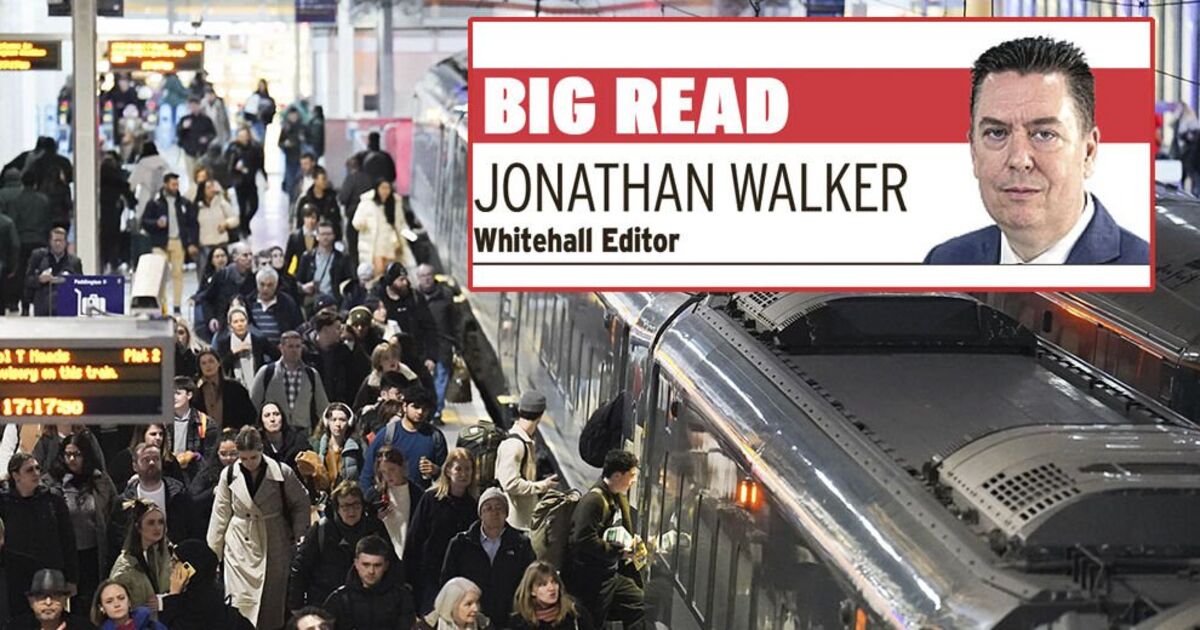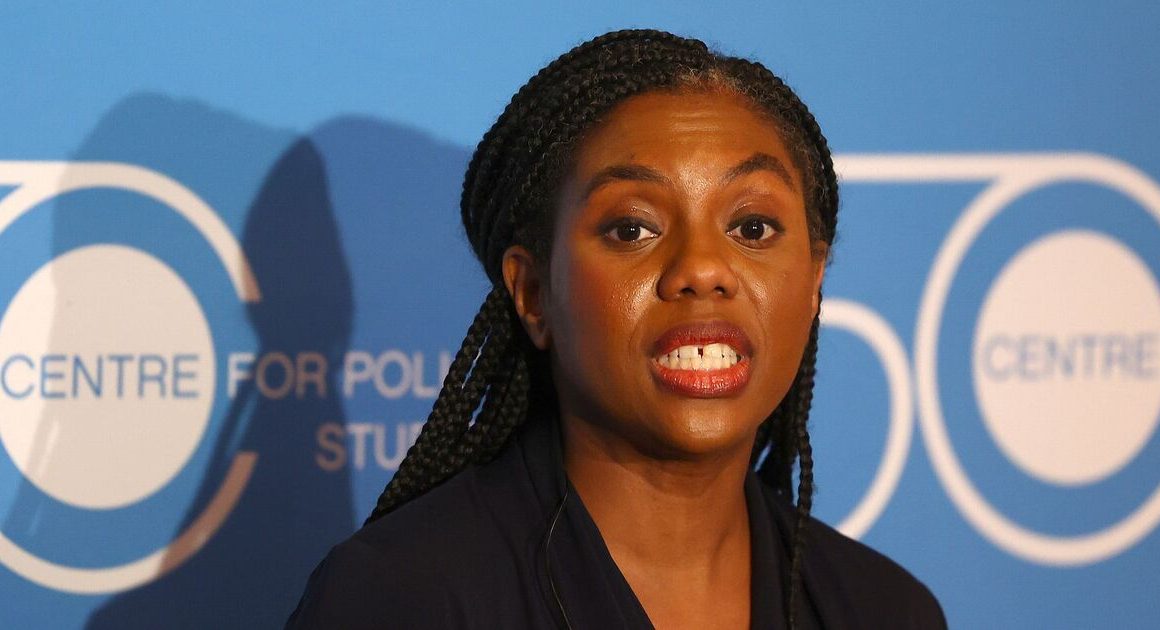Labour were cock-a-hoop after handing train drivers an inflation-busting pay rise last year.
Louise Haigh, the Transport Secretary at the time, boasted: “When I took this job, I said I wanted to move fast and fix things – starting by bringing an end to rail strikes.”
Never mind that bumper pay rises would cost £135 million in just the first year. The Government was “doing the right thing and putting passengers first,” she said.
And of course, there was a dig at the Conservatives, who she claimed “were happy to see the taxpayer pay the price as strikes dragged on and on, and passengers suffered.”
How times change. Ms Haigh has been despatched to the back benches after it emerged she pleaded guilty to a fraud offence a decade ago, and rail strikes are back with a vengeance.
The RMT union has announced industrial action affecting Avanti West Coast services on Sundays, starting tomorrow and continuing until June.
This includes long-distance trains connecting major cities such as London, Birmingham, Manchester and Glasgow along with towns and smaller cities such as Coventry, Milton Keynes, Preston and Carlisle.
Only one train in four is expected to run on strike days. The advice from Avanti is simply to avoid travelling but those who have no choice can expect carriages crammed full of miserable passengers.
The row involves payments for train guards who work on rest days and have been offered between £250 and £300 per shift while Avanti managers can be paid around £500 for similar work. The RMT says it hopes to reach a settlement bringing strikes to a swift end.
But one thing is clear: the unions have Labour over a barrel, and are happy to accept bumper pay rises only to turn around and demand more, whatever the impact on commuters.
This was made clear last week when Avanti was forced to cancel services after drivers refused to walk to their trains in the snow – despite receiving a 15% pay rise over three years that will send salaries above £70,000.
But industrial action is just one of the problems afflicting our rail services.
Labour is banking on its policy of nationalisation to improve journeys. The rail network itself, including the track and most stations, has always been publicly-owned but many trains are operated by private companies.
The Government is to create a publicly-owned operator called Great British Railways, which will run trains instead. But the omens are not good.
Northern Trains, which provides services to cities including Manchester, Liverpool, Newcastle and Sunderland, was nationalised in 2020 and its performance is abysmal.
In fairness, Northern Trains was bought under public control because it was already particularly bad, with the previous Conservative government accusing it of “unacceptable” delays and cancellations.
But it’s got worse, with fewer than six in ten trains arriving on time between July and September last year, down from seven out of ten in the same period in 2021.
Greater Manchester’s Labour Mayor, Andy Burnham, has accused the operator of “ruining people’s lives” and is so outraged that he sends a weekly text to the Transport Secretary every Monday demanding action.
We can only hope that Labour’s Great British Railways defies the odds and does succeed in improving service. What we know for certain is that the cost to passengers is going up.
The Government has announced that rail fares will rise faster than inflation with an increase of 4.6 percent in March, and the cost of most rail cards is due to increase by £5.
Passengers might perhaps take heart from the numerous promises by politicians over the years to expand the rail network. Surely this will lead to more trains, and more chance of getting a seat?
But efforts to create new lines are in disarray.
The biggest project, of course, is HS2, which is due to provide new services between London’s Euston station and Birmingham. A northern leg, which would have continued to Manchester, has been cancelled.
Officials admit, however, that they have no idea when HS2 will be up and running.
What’s more, although £32.8 billion has been spent on the project so far, they don’t know what the final cost will be.
Dame Bernadette Kelly, the Permanent Secretary at Department for Transport, made the astonishing admission to MPs at a recent House of Commons committee hearing. She said: “We have been working to establish with HS2 what an accurate and robust cost range for this project now is. I am afraid that I have to report that we do not have such an estimate.”
HS2 Ltd, the company set up to build the line, had suggested the final cost could be up to £81.7 billion (once the figures are adjusted for inflation). But Dame Bernadette admitted: “That is an unassured figure. We do not regard it as a reliable and agreed cost estimate.”
In the circumstances, you might feel some relief that the section of HS2 north of Birmingham, known as phase two, has been scrapped. But Department for Transport officials have warned Ministers that without it, the existing West Coast Main Line may be unable to cope with demand for rail services by 2030.
In other words, the nation does need new rail lines. It just seems that we are incapable of building them.
Some experts have argued that improving services in the north of England is more important than building HS2, and both Labour and the former Conservative government vowed to do just this.
But it seems a promised “northern powerhouse” network linking cities such as Manchester, Liverpool and Leeds is also set to be axed.
Dame Bernadette told the MPs: “In the plan that the previous Government set out there are big value-for-money challenges around Northern Powerhouse Rail.
“There are also a number of things that would need to be taken to address those value-for-money challenges. In the end, the Government are going to need to make a choice through the spending review and the infrastructure plan on what investment they prioritise.”
We’ll have to wait until Labour’s infrastructure strategy is published in the Spring to learn the final fate of Northern Powerhouse Rail, but it doesn’t look good.
Does it matter? Well, yes. Rail passengers in Great Britain make more than 140 million journeys every month and while the numbers remain lower than before the Covid pandemic they are creeping back up.
The ability to get from A to B isn’t just important for travellers. It’s vital for the economy, and there’s a clear link between good transport links and economic growth.
In addition, getting freight off the roads and onto the rail network is vital if Labour is to meet its goal of moving to “net zero” carbon emissions.
But our rail network is in a state of chaos and there is little sign of things improving.
Perhaps Heidi Alexander, the new Transport Secretary, will succeed in turning things around. But one thing is certain – simply throwing money at the trade unions won’t do the trick.












